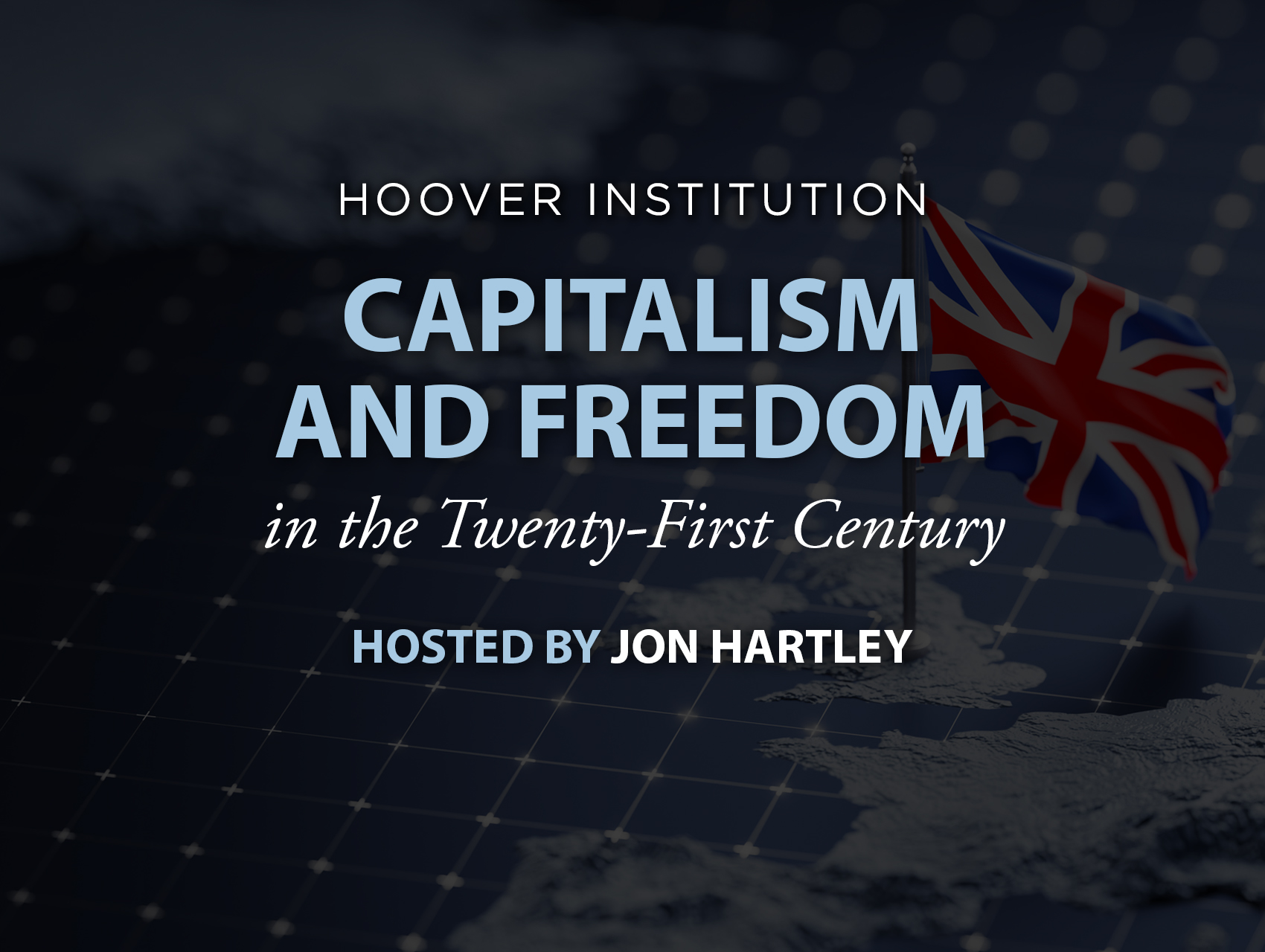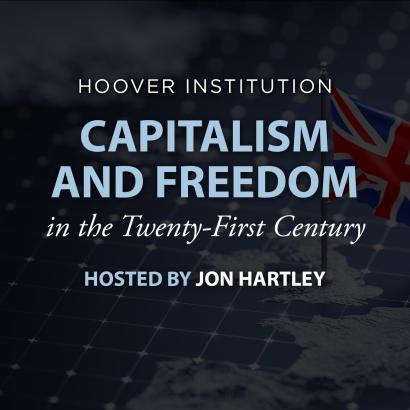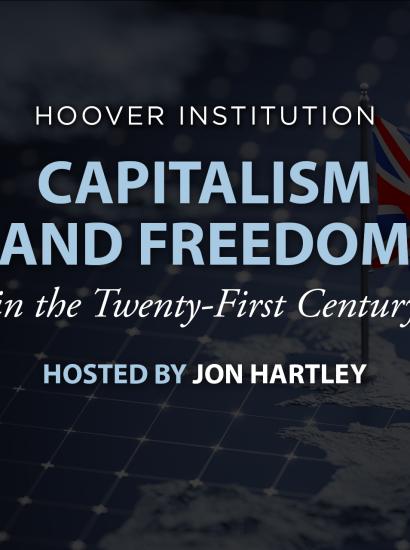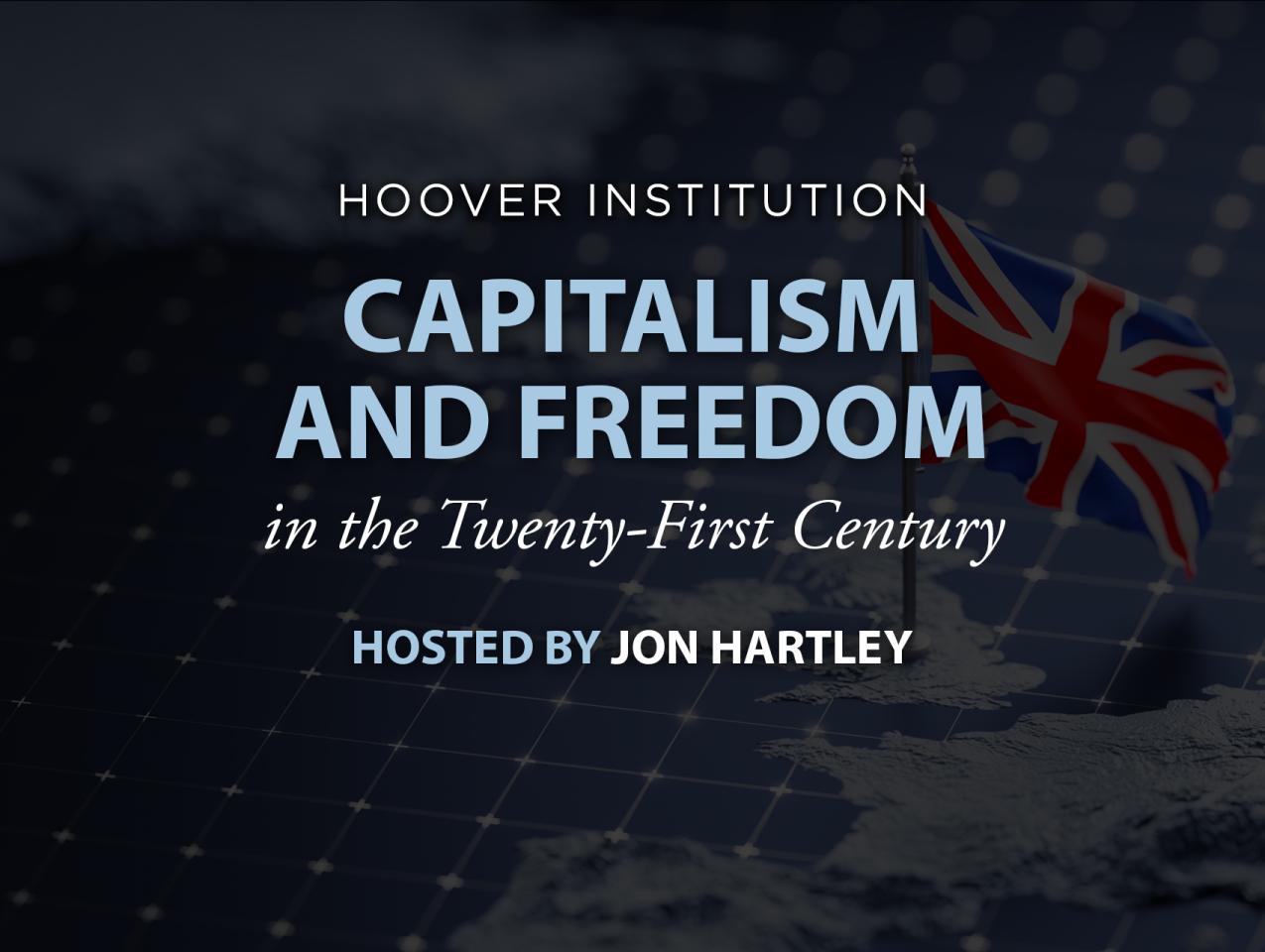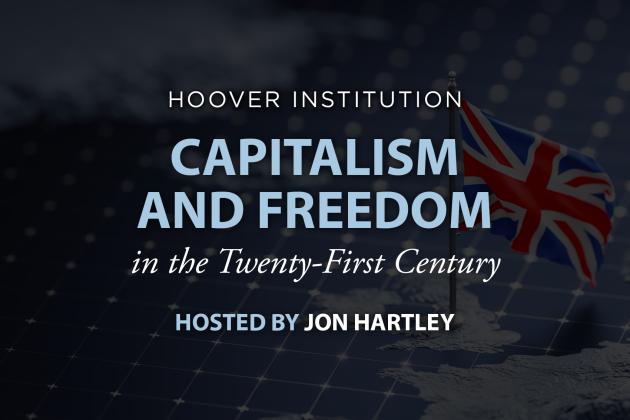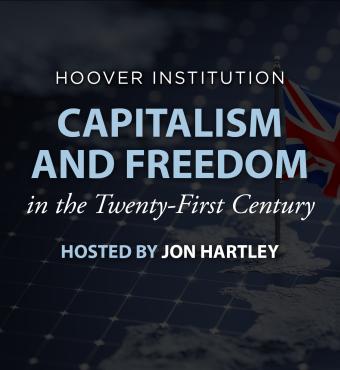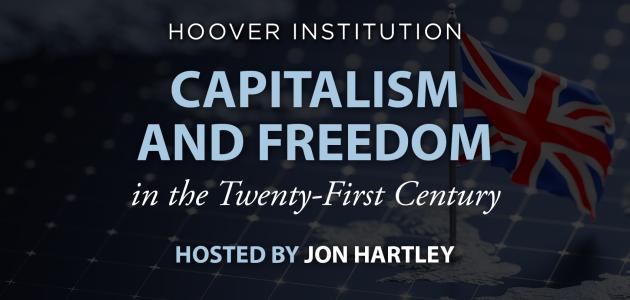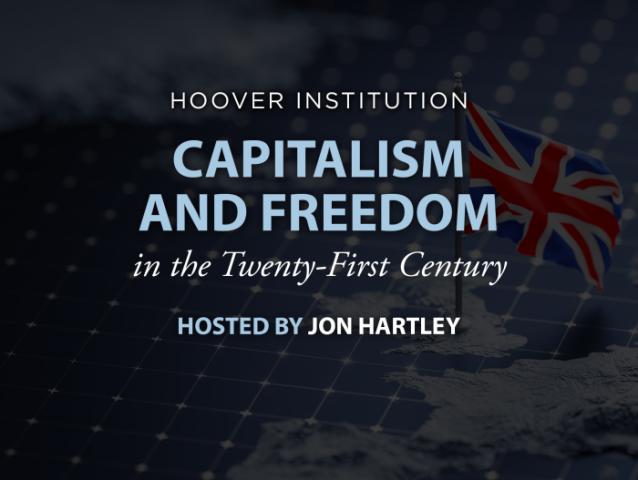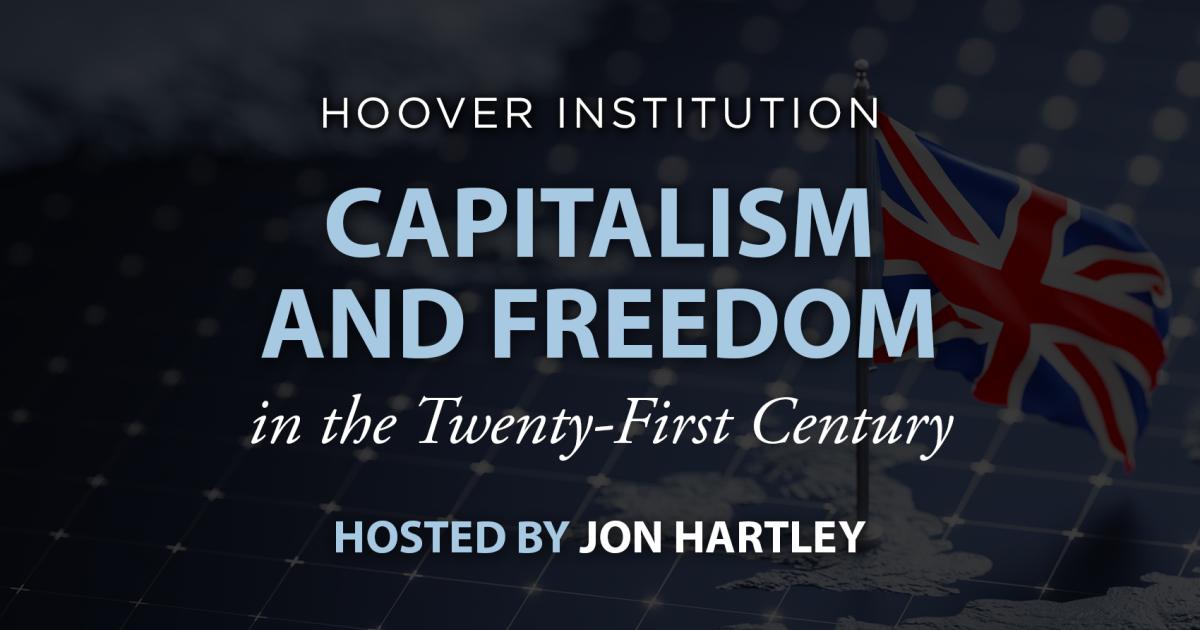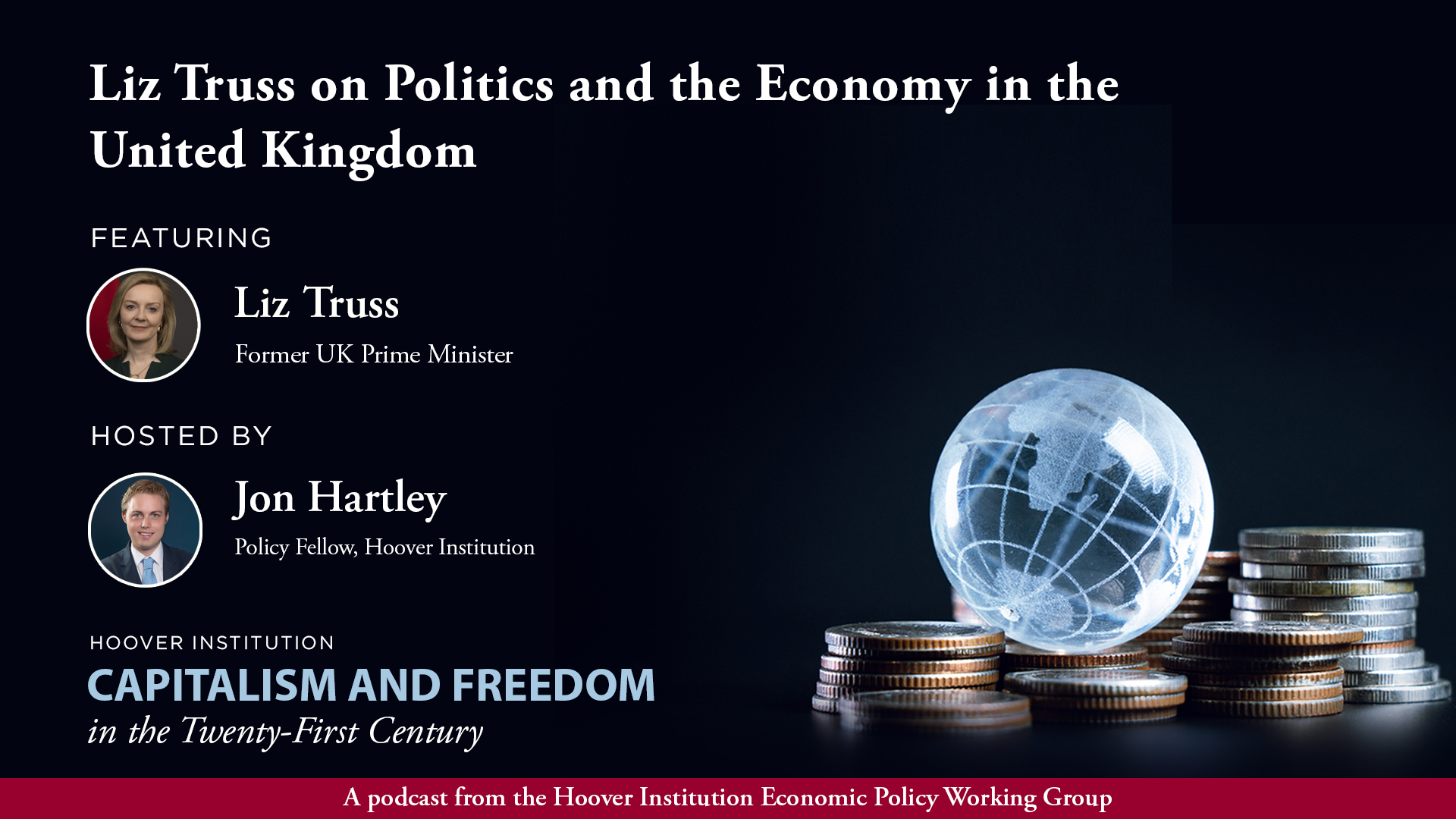- Economics
- Economic
- Europe
- Answering Challenges to Advanced Economies
Jon Hartley and Liz Truss discuss the former UK Prime Minister’s upbringing and her early interest in economics and politics, her pro-growth policy vision for the United Kingdom, her premiership and the 2022 UK gilt crisis, the state of free speech in the UK and the anglosphere, the Starmer Labour government, the role of the UK and its allies in the world amidst the rise of China, and the future direction of politics and the economy in the UK.
Recorded on July 21, 2025.
>> Jon Hartley: This is the Capitalism and Freedom in the Twenty-First Century podcast, an official podcast of the Hoover Institution Economic Policy Working Group where we talk about economics, markets, and public policy. I'm Jon Hartley, your host today. My guest is Liz Truss, who served as Prime Minister of the United Kingdom in 2022, as a Tory MP from 2010 through 2024, where she served in a number of cabinet positions, various Conservative governments, including Foreign Secretary.
She's also most recently the author of Ten Years to Save the West. Welcome, Ms. Truss.
>> Liz Truss: Great to be on the show.
>> Jon Hartley: Well, I wanna start with your early life and it's a real honor to have you on here. You were born in Oxford. Your father was John Truss, who's a professor of mathematics at Leeds.
And you also studied at Oxford, like many British Prime Ministers, and you studied philosophy, politics and economics. I mean, at what point do you first decide that you like politics and economics and that you actually want to do this for a living? Was this something that was just destined, given that you were born in Oxford, or was this something that you came across over time?
>> Liz Truss: So I was always quite interested in politics and Politics in the 80s was very interesting and exciting and of course there was a big battle between the US and the USSR who was gonna win the Cold War. And my parents were on the left wing side of politics and my mother actually campaigned against nuclear weapons.
She was pretty anti-American actually, and certainly anti the policies of the US administration at the time. I think one of the first political people I heard about was Caspar Weinberger, which must be quite unusual for a child growing up in the 80s in Britain. And when I got a bit older and I saw what was actually happening and the role that Mrs. Thatcher successfully played in bringing to an end the Soviet Union and bringing to an end the Cold War, I sort of thought, well, actually, disarming wasn't the right strategy.
It was the right strategy to actually call out the Soviet Union, talk about how there was a huge problem. It was obvious when the Berlin Wall fell and all the people were trying to get into the west, it was obvious that the Soviet Union was not an aspirational model of the world.
Yeah, I think my mum in particular was slightly misty eyed about what happened, even though she'd spent a year in Warsaw in the 1970s. So she knew perfectly well that the model didn't work. So that's, I guess, my first exposure to politics and talking about politics. And then I joined the Liberal Democrats and people were saying, why did you join?
What was not the Conservative Party. But the answer is my parents were very left wing and almost being a liberal was the acceptable face of being right wing where I was in Leeds at the time. And it was only really when I got to university and met Conservatives that I decided I was a Conservative and I joined the Conservative Party.
>> Jon Hartley: That's amazing. And yeah, I feel like certainly college and universities can be one of those, I think, transformational periods, I think for a lot of people and discovering sort of what they believe in, that's quite interesting. So I take it Thatcher has sort of been your North Star for you from the beginning.
>> Liz Truss: So I think the thing that really sort of started me on the road to being on the right of politics was actually experiencing what happened at my school. I went to a comprehensive school in Leeds, which is in the north of England, and it was very politically correct.
There were lessons on racism, there were lessons on sexism. And I just thought, this is a load of rubbish. Why are kids being taught about this stuff when some of them in the school weren't actually very good at reading and writing? And that was my first exposure to kind of left wing ideology.
And it was that that really put me on the road, I think, to being a conservative and wanting to live in a country that was successful, not a country that was just making excuses the whole time. And the places I grew up so Paisley in Scotland and Leeds in England, frankly, the, their better days were behind them.
They had been pioneers of the industrial revolution. They'd been huge manufacturing hubs and they were now full of disused factories and derelict buildings because they'd lost a lot of their purpose. And I just thought, why does it have to be like this? So it was more being in quite a left wing place and just thinking, these left wingers, what are they actually talking about?
Their solutions don't seem to work. And when I got to university and started studying economics and I almost arrived at economics by accident, I'd actually gone because I was interested in politics. And the degree course was politics, philosophy, and economics. So economics was a bit of an afterthought once I started studying it and saw everything from free trade to how free markets work, I've begun to understand why it was that these places that had been so successful had been competed out of business.
The policies that the British government had adopted of nationalizing industry, this is, I'm talking about the sort of post war Atley government hadn't been effective. And I became very concerned about Britain joining the Euro because which was being pushed by the labor government of the time, because I could see that having a sort of free floating currency was one of the ways that a country could actually adjust its economic policy.
So all of those things I then started to learn about and I built that worldview.
>> Jon Hartley: Well, I think it's rare for, I guess, politicians in general and members of Parliament to be numbers oriented. Obviously you grew up in a family where you have some very amazing mathematical minds in your own family and doing philosophy, politics, economics and working as an accountant and doing all these things.
I feel like that's just a rare skill set for politicians in general. And I mean, it does seem like there was, I guess this rift in the late 80s too, between the Thatcherites and John Major and the role of UK in Europe, I think was a big part of that and the euro was a big part of that break.
So to me, I see that as sort of being one of these key moments, also setting Hong Kong on the course that it's been on. So I guess, fast forward a good number of decades later here, you come in as Prime Minister in 2022, you have a firmly pro growth agenda at the outset of your premiership and you wrote a book, in fact, ten years prior called Britain.
Britannia Unchained, Global Lessons for Growth and Prosperity. So I think economic growth has been something that I think is always been front of mind for you, is my sense. You co-authored this with four other Conservative MPs, including your Chancellor Kwasi Kwarteng. And I'm just curious one, can you describe to me, I guess, what this growth sort of thinking and plan has been for a long time?
Obviously you've been thinking about it for a long time, but how badly in your mind does the United Kingdom need pro growth policies and sort of a revamp on economic growth? We can talk about what's going on now and the Starmer premiership, and many things are going in the worst direction, in an opposite direction.
But I'm curious what's been your vision as far as growth United Kingdom over the decades going into your premiership?
>> Liz Truss: Well, so the reason we wrote the book is we felt that Britain was on the wrong track, even though at the time we were junior backbenchers in a Conservative government.
So we felt that the policies the country desperately needed weren't happening. And that is why we wrote the book. Looking at how do economies actually succeed, what does it take? Cuz Britain was already stagnating. It was already stagnating by the 2010s. It had been going on for some time.
You could argue that it really started in the 1990s with the coup against Mrs. Thatcher. That's where it started. But that is only the recent history of Britain's economic failure. In fact, it goes way back to the end of the 19th century, the development of the permanent bureaucracy, the failure to really take on the Americans and Germans in manufacturing.
Britain was a country that led the Industrial Revolution. But the fact is that we got overtaken, and we got overtaken due to a variety of factors. You've talked about the lack of politicians who've got numerical skills. I could make that more general point. Across the population, Britain is not done enough to compete in areas like manufacturing.
Even though we've had great universities, we've not been good at translating that into economic success. And what we've had is a very, very powerful bureaucracy. We've had elements of socialism in our country for a very long time. Of course, those were introduced at the start of the 20th century.
But if you look at the Attlee government nationalizing huge swathes of industry, creating the National Health Service and the welfare state, we're now in a position where the British government is spending 45% of our GDP. And even, back when we wrote the Book Britannia Unchained, it was still up in the high 30s, it's now got even worse since then.
And at the same time, we've just got huge levels of regulation on our economy. Partly that is driven by our membership of the EU, where lots of regulations were added, but a lot of it is domestic. The Town and Country Planning Act makes it pretty much impossible to build anything anywhere in Britain.
We've got incredibly expensive house prices. Our energy costs are four times what the energy costs are in the United States, partly because of the environmental agenda, partly because fracking has been banned. But on every possible measure, we are economically very uncompetitive and we now have the fastest rate of millionaires leaving the country of any nation in the world, apart from China.
But what I'm saying and what we say in Britannia Unchained is the seeds of that are very longstanding in Britain. It's a cultural issue. There's an anti success culture, sort of. We call it the tall poppy syndrome of the tallest poppy gets cut off an entry, entrepreneurial culture.
So if I'm to compare us to the United States, there's much more of a fail fast culture in the US and people respect people that build up businesses. I think that's less, less true in Britain. So these were all the things that we were trying to address. And it does go back to what I was saying about the places I grew up in.
I want to see them be successful. I think it's incredibly depressing. A country that's declining and living in a country that's economically declining leads to all other types of decline, whether it's high crime rates, drug abuse, social unrest, all of those things result or are correlated with a poorly performing economy.
So to me, that was the number one issue that we, we had to deal with.
>> Jon Hartley: Absolutely. And yeah, I mean, it's amazing to see what's happened to the UK so over the decades. I mean, obviously World War II UK being bombed out, I mean, had a huge impact on Britain's growth trajectory and the US in many respects overtaking the UK is having the world's reserve currency become the world's largest economy, in the post war period being almost half the world's GDP at that point.
Obviously, many other players are, are, are growing now, China and many others. So I wanna talk about early in your premiership we have on September 23rd, your Chancellor Kwasi Kwarteng delivered a Ministerial statement titled the Growth Plan and it proposed to reverse an increase in the corporate rate increases that were scheduled, also a cut to the personal income tax.
A proposal to essentially implement many of these. I think great ideas aligned in Britannia Unchained and really I think a pretty standard sort of pro-growth agenda, like in the US largely, in part deficit finance, then all hell broke loose. I mean, I'm curious-
>> Liz Truss: If I could cut into this deficit finance thing that it wasn't deficit financed.
The fact is the deficit in Britain was huge and the debt was huge. But my view was if we'd done nothing, taxes would have gone up because that had been legislated for and taxes going up were actually going to result in a worse deficit because certainly over a period of five years.
And a lot of independent economists agree with me on that, that if you raise corporation tax so much you damage economic activity, businesses stop, stop opening and companies leave the country. Which is exactly what's happened. And it's the idea it was deficit financed as opposed to all of the spending increases which have now been allowed under the Labour government.
That is a leftist talking point and it's a point that's being used against me. But I would argue that what we were doing was not deficit financed. It was actually creating the growth would have helped pay off the deficit. Now that the policies I put forward were not implemented, we've got the counterfactual and the counterfactual is the debt has gone up.
So it wasn't deficit financed.
>> Jon Hartley: Yeah and I think I'm with you in that the media, I think, portrayed a certain narrative that does incorrect at the time. And I think a lot of economists had sort of gone back to this period. And there was this big spike in 30 year gilts that moved from 33.5% to 5% in only a few days.
And I think in hindsight now, I think a lot of economists now look at this as in part being sort of a confluence of factors. So things like liability driven investment strategies, employed by pension funds, because they have to match the duration of their liabilities, even a small jump in guilts can be sort of accelerated by pension funds that are now forced to sell their UK government bonds.
And also you had sort of this auction at the same time. And so something that probably would have been a routine small jump in government bonds was really exacerbated. So I'm just curious, how do you think about these sort of other facts in terms of what was going on?
>> Liz Truss: I think it's important to. I think there were various things going on, but the fiscal package I announced was smaller even by the Office of Budget Responsibilities numbers, which I don't necessarily agree with. But it was smaller than the fiscal packages Rishi Sunak announced and it was also smaller than the fiscal packages Rachel Reese have announced since.
So there is something about the way that the mainstream media and the economic establishment in Britain view public spending as opposed to tax cuts, i.e. They're much more willing to accept the idea that whereas they don't accept that tax cuts are inevitable or need to be done. So there's a asymmetric attitude by what I would describe as Keynesian economists, which now dominate the treasury, the bank of England, the Office of Budget Responsibility.
And what has happened in Britain is that those entities have required a lot more power. So Gordon Brown made the bank of England independent. They used to be under the control of the Treasury. He put the Civil Service Code into law. So it made it much harder, in fact, impossible to hire and fire bureaucrats.
He also, this actually happened under George Osborne. The Conservative Chancellor created the Office of Budget Responsibility, which is a bit like an extreme version of the Congressional Budget Office. So essentially those bodies were making judgments about economic and fiscal policy that I believe should be political judgments, but were made by those bodies.
And those bodies have a very, very clear worldview. And it's the same as the worldview taken by the IMF, taken by the Democrat Party in the United States, taken by the World Economic Forum. Public spending good, tax cuts bad. And this is why, despite the fact Rachel Reeves has announced policies that are much larger fiscally, they've been on the spending side.
So that's entirely acceptable to these people because they like big government. So that was one factor, the sort of bias in the system and the group think in the system that was pro Keynesian. And that's been building up for many, many years. Essentially, since the successful supply side of the policies of the 80s, that kind of worldview has been building up.
And I think that if you look at the backlash Donald Trump has faced in the markets from economists, it's the same worldview that has become prevalent and we need to defeat that. And I think Scott Bessent is doing a very good job of making the argument for supply side policies.
But separate to that, there was an issue, unbeknownst to me, taking place in the markets themselves, and you referenced it. These LDIs that pension funds had invested into, they were essentially a leveraged product that depended on interest rates being low in perpetuity. Now, of course, they weren't gonna be low in perpetuity.
They were artificially low. Ultimately, interest rates had to rise and those funds were caught short. It created a run. And what happened is the bank of England, which is meant to be responsible for financial stability, rather than ensuring financial stability, used the opportunity to try and push the blame onto the mini budget for what was happening was in fact their failure to properly regulate the pension funds.
And that was very difficult for us because we weren't aware of the LDI issue at the time. We were blindsided. And subsequently the bank of England themselves have admitted that two-thirds of all the gilt spikes that took place after the mini budget were actually downed to LDIs. So they've admitted that two-thirds of the market movement were essentially their fault, but they've only admitted that last year, long after I'd been removed from office.
So you had a situation where there was a very strong group think in favor of one sort of economic policy. And I tried to upset that, I tried to disrupt that because I felt that was the economic policy that had led our country to decline. But the second thing was that there was a tinderbox in the market that I wasn't aware of.
And the bank of England and others tried to blame me for their mistakes.
>> Jon Hartley: I totally agree with you in the sense that one, I mean, there has been this enormous rise in new adherence to Keynesian economics, especially I think, since the Great Recession. And the gold financial crisis in the late 2000s.
And what's interesting, too, is for all these people who say that Keynesian multipliers are very high and that in some cases that government spending somehow pays for itself, how is it the case that debt to GDP ratios around the world continue to rise in advance economies in the way they have, right?
And so to me, I mean, and if you look at a lot of, I think, good empirical work done by economists, including the Hoover Institution, by folks like Valerie Rainey and others, the Keynesian multipliers ultimately are much lower than they actually are in reality. And that doesn't mean that there can't be some stimulus during recessions.
But I think what it does sort of pink bears that it's ultimately not a growth plan and that if there is gonna be some spending during these good times or bad, that just government spending tons of money isn't gonna cause some economic boom like many seem to think, including, the current Labor government and many others.
And I think, too, would really sort of, I think, strikes at court as well. Maybe this is just a characteristic of our age is just the desire to lay blame on others. I think, the Federal reserve in the US still won't in any way acknowledge the role that maybe how late they were to raise interest rates in 2021, 2022, might have made inflation worse.
It's just very much a, the inflation came from elsewhere. And nothing to do with all the stimulus-
>> Liz Truss: Absolutely, I mean, and this is back to the point I was making about the bureaucracy. The bureaucracy has become increasingly empowered and Central Banks are the ultimate case of this.
And the fact is they've failed. Inflation has been rampant, it's been particularly bad in the UK, interest rates were raised too late. We had massive quantitative easing essentially to pave the way for all of this public spending. Keynesian economics hasn't worked. We've ended up with massive debts. And I think the Federal Reserve is more part of the American political dialogue that there is talk of ending.
The Fed being part of the problem, in Britain there is less scrutiny of the bank of England, and that needs to happen because you've got a system where the bureaucracy has gone unscrutinised, they've failed and they're not accountable. And I think in order to get the economic policies we want, which are supply side policies, small government policies, those types of policies, we have to change the role of central banks.
I think they have become a big part of the problem.
>> Jon Hartley: Yeah, and at some level it's interesting how independence of Central Banks, which I think is an important, in a real thing, in the sense that-
>> Liz Truss: The word independence, when something's independent, independent from what? And what it's become is independent from blame or accountability, that's what they've become independent from.
And ultimately institutions that aren't accountable to the public or aren't accountable to market become a problem. And I think they fundamentally, in Britain, we had a better system where the treasury and the Chancellor were accountable and then the bank of England was accountable to them. The system worked, we moved away from that and our economic problems have got worse.
>> Jon Hartley: Yeah, whether you think it's research or discussion of green monetary policy, or how Central Banks can solve issues of race or other things like that. It's not to say that these aren't important issues, obviously.
>> Liz Truss: This is institutions getting captured, because if they're not accountable to the public, they start to become accountable to NGOs or lobbyists or people with the loudest voices.
And you've had the green fashion or the DEI fashion, and that has taken over the thinking of these institutions and they've lost sight of what they're meant to be there for. The bank of England has two jobs. One is financial stability, which it completely failed to deliver in October 2022, and the other is keeping inflation low, which it completely failed to deliver.
If the head of the bank of England had been a politician, they would have been sacked long ago. And that shows you that there's massive problems with the incentives in the system.
>> Jon Hartley: And I think, I wanna get into the media a little bit cuz I think the media plays a role in all of this at some level.
I think the media does tend to hold water for a lot of these, say, bureaucrats. I mean, could you imagine how different the narrative would have been if, say, Trump was in power in the 2021, 2022 inflation period and imagine inflation similarly jumped. How would the media characterize inflation then?
And I think rather than painting it as a picture of, it's all supply chains coming from elsewhere, I think they would have blamed Trump in the same respect that they're trying to now look at terrorists and try and sort of look at inflation prints and tie them together and maybe tariff will cause some one time price impacts.
But I guess the point is, to me it seems like the media is obviously biased and the mainstream news obviously biased and obviously, I think has played a huge role in all of this, I think, including especially in your premiership. I think the media obviously went berserk and were relentless and I think, to be honest, in my opinion, were quite unfair and never really gave your premiership a chance.
You coined the term anti-growth coalition to describe sort of resistance from unions, the media, environmentalists, the parts of the Tory party. I'm just curious, obviously real GDP has been flat for a decade and a half in the UK. What are the major institutional roadblocks in your mind to reignite economic growth in the uk?
I'm just curious, what kind of obstacle do you think these groups play in realizing a true reform kind of vision? Obviously, the Labour Party's in power now, so the opportunity for pro-growth reforms has perhaps even been further diminished. But I'm curious, thinking long term 20, 30 years, what sorts of institutional roadblocks need to change in order for there to be any hope for growth in the UK?
>> Liz Truss: I mean, on the media, I think part of the problem is, yes, they are biased or the mainstream media is biased towards the left and they're also biased towards state institutions because they have kind of permanent relationships with civil servants, state institutions which are quite undermining, I think, of people trying to change the system.
So system change is not something they like. They want to keep the status quo. And the other thing is the media has just got increasingly trivial. So whereas there would have been detailed analysis of economic policy, if you watched a political show in the 1980s, the expertise has been hollowed out.
So it's much more of a coverage of a pantomime who's up, who's down, who's plotting against who, soap opera than it is real analysis of the issues. So I think there's two different problems. One problem is their bias, but the other problem is they're shallow. And that makes it very difficult for people like me who want to change things fundamentally about our country, because having those serious discussions is extremely hard.
Who are the vested interests? I mean, the bureaucracy itself is a massive vested interest. The government's spending, almost half of GDP. Those are people's jobs, their livelihoods, their future careers. Of course, they don't want to see that system dismantled. Of course, they don't want to see transparency over what they're doing.
Of course, there's also all of the NGOs, and there's been lots of talk about the Soros Network and the World Economic Forum, but there are a lot of organizations funded from groups outside the UK who are lobbying for policies. So this Labour government, they said that they want to build more houses and Britain has a massive problem with housing.
In the 1940s, Attlee introduced a piece of legislation called the Town and Country Planning Act, which basically socialized land in our country. So it's very difficult. So Labour wanted to make some minor changes changing environmental laws. There's been a massive backlash from the environmental NGOs and now they've stopped that.
So this means you can't build something because there might be a bat there or there might be a newt there, all those kind of things. So it's a combination of the bureaucracy, the NGOs, the big corporations that benefit from state regulation. The people receiving the green subsidies or the people getting the DEI money or all this kind of stuff.
So there's a whole bunch of people. And what I think has changed about Britain and America is the elite is now left wing. The elite are those people, they tend to live in the big cities, they talk to each other, they work in the media, they work in the big corporates, they work in the bureaucracy and they want to protect the system.
Whereas it's the working people who their jobs have, gone because the country's de-industrializing or they can't run their small business because there's so much red tape. It's those people that want change. And this is what I was talking about when I was talking about the anti-growth coalition. It is those vested interests, it is the people who have that political power at the moment and ultimately that entire system needs to change.
I watch what's going on in America and I see that Donald Trump is trying to challenge those types of vested interest.
>> Jon Hartley: I wanna talk a little bit more about the Labour Starmer government. I'm curious, where do you see the UK now under the leadership of Keir Starmer, who's been in power for-
>> Liz Truss: We're heading for bankruptcy is what is happening.
>> Jon Hartley: Well, I'm curious they've passed a number of radical changes. On the tax side, they've abolished non-dom and are now gonna start taxing profits outside the UK. I think for a long time, the UK and London has been a very business-friendly place.
I mean, I think for people around the world to do business there. And I think there were some questions or concerns maybe around Brexit for a short period of time. But I think those were largely smoothed over, and the banks have largely stayed in the UK, but I think this is a pretty big sea change now, actually taxing profits from outside the UK.
The sovereign government's also proposing to lower the voting age from 18 to 16, not to mention all this spending and so forth. I mean, what is the path in your mind? I mean, it's interesting to see how quickly they've, I think, lost some of their popularity in the polls.
But they've got another three years at least or so. I'm curious, where do you think the country is heading and what hope do you think there is here?
>> Liz Truss: I think it's important to note that things were bad even before Labour got in. That's why I tried to do what I tried to do because we had a huge debt, we were spending vast amounts of money, taxes were the highest level for 70 years.
So things were already bad, and Britain was getting less competitive. And the reality is that post financial crash we have been the slowest country to recover from the financial crash in terms of GDP per capita. So there is a fundamental problem with Britain's economic model. We're not competitive enough, our energy isn't cheap enough, our taxes are too high, our welfare state doesn't work.
The many problems that we discussed in Britannia Unchained still exist. But what Labour have done is they turbocharged it, so made it even worse by abolishing non-doms, by putting up taxes, everything from VAT on private schools to making it. They're introducing a new Employment Act that will make it much harder to employ people.
They're just making everything worse. And the reason is that they believed, and this is partly what happens when you have a media that doesn't really tell the truth. They believed that the reason Conservatives were failing is because of austerity, because we weren't spending enough money, which is absolutely ludicrous.
As I've said, the reason the country wasn't doing well is we hadn't had enough economic growth. So they believed their own publicity. They believed that if they got into power, spent a bit more money and were nice to the bureaucracy, everything would be fine. And in fact that hasn't worked.
They are extremely unpopular. They will be voted out of office at the next election. It's not just on economic issues as well. We've got huge problems with our criminal justice system, with two tier justice, a failure to stand up to Islamism in this country. The public are extremely concerned about where everything's going.
And I wasn't joking when I said, I think there will be some kind of fiscal collapse in the 1970s. A Labour government had to go to the IMF for a bailout in 1976 because the country was stagnating. There was high inflation and they were not able to fund government debt.
And I think that is the situation we could be in in pretty short order. And the Labour Party MPs are not willing to vote for spending cuts. They rejected some welfare reform that was proposed by the government. So unless there is some kind of miracle, it's hard to see how the show stays on the road.
>> Jon Hartley: One thing I think that probably strikes a lot of Americans do, I think have a pretty good sense of the First Amendment rights and right to free speech. And there are very strong protections in the US, unlike in the US, the United Kingdom never wrote down its constitution.
>> Liz Truss: We did have the Bill of Rights in the first place, I think, 1689.
>> Jon Hartley: Well, Canada, where I grew up, we have a constitution as well, terror rights and freedoms. But I guess you just don't have the same kind of protections that you do with sort of in the same way that the US constitution is enshrined a judicial review.
All these sorts of additional separation of powers, sorts of things that you don't really have in a parliamentary system checks on government. And so I'm just curious, I mean, do you see this as sort of this maybe global challenge across the Anglosphere, where in Canada, the UK, Australia, New Zealand.
You don't have the same sort of protections to things like free speech as you do in the US. I mean, I think of things like Speaker's Corner, which obviously is meant to, there's a number of things that I think in UK that sort of are old messages trying to celebrate these sorts of things.
But now if you listen to say, Vice President JD Vance's speech and you're talking about at the Munich Security Conference, and you see these issues where people are being arrested for political films or people are being arrested for praying in protest of certain things. Those aren't the sorts of things that I think you see in the US regularly.
And I'm curious what your thoughts are on the state of free speech. And these are other sorts of property rights protections and other things that may be weaker in the UK and how does that get resolved if at all in Uk in your mind?
>> Liz Truss: The underlying principle of the British Constitution is parliamentary sovereignty.
And we do have a Bill of Rights and we did put in place free speech. The problem is that since then legislation has been passed which has removed these rights and be done by a majority in Parliament. So what needs to happen in order to restore the British Constitution to what it was is to repeal those laws.
It's as simple as that. And you're right, it's harder to change things in America. So it's harder to get rid of the First Amendment or it's harder to change things like the Supreme Court, in Britain it's easier to change them, but it means there's less long term protection.
So what I'm saying is, particularly under the Blair government and since we have seen the judiciary become unaccountable, we've seen the bank of England become unaccountable, all of these laws have been passed, these laws against free speech have been passed. Like online harms legislation, those need to be repealed, but they can be repealed through an act of Parliament.
The problem is we don't have a government that wants to repeal those things. And this is why there is such a massive disconnect between the public and the government and the elite that run the country. But there are other similar issues in America. If you remember, I mean, Hillary Clinton was arguing for the First Amendment to be changed.
There are plenty of people like the woman who I think is now being defunded but runs the public radio, she was saying that she didn't believe in free speech. So those forces are there in Western societies. They're fundamentally anti-democratic forces, they don't want the public to have a point of view.
But I think in each country the battle needs to be fought in a different way. And of course the US has the First Amendment, we have our ancient British liberties. The problem is they've been covered over with all this terrible stuff that's been legislated in the past 40 years.
And what we need to do is elect a government that's gonna restore the historic British constitution.
>> Jon Hartley: I guess, my question when I think of Tocqueville a lot and the idea of the tyranny of the majority, could UK even elect a government that could really restore these sorts of freedoms?
And I guess that that's the one challenge sometimes with some majority type governance where it only takes 51% of the populace to agree to kill the other 49, right? And so, an extreme obviously, but I guess, that's the one sort of beauty of the US Constitution where it's protecting even minority rights or instances of people where the majority be against.
>> Liz Truss: I think the US Constitution is a very good document, don't get me wrong, I think it's a good constitution. That's not to say the United States does not have issues with things like the Supreme Court, and there's no perfect constitution. But you asked would British people vote for it?
Answer, 52% of the British public voted for Brexit, that they are prepared to vote for more big change if it is clear what they're voting for. So I think the problem has been, and this is why the Conservatives did so badly at the last election is the Conservatives were not clear what they stood for.
And in fact the Conservative Party is deeply split about what it stands for. But I believe a proposition to restore the British Constitution and give British people back the freedom of speech is incredibly popular and people would vote for it.
>> Jon Hartley: I guess, I'm curious what the path forward is in your mind to get to a place like that and who the standard bearers will be, leading that charge sort of out of where the UK is right now on a number of these sorts of fronts, both economic and legal.
I mean, I'm curious, you've got the UK Conservatives, the Tories being led by Kemi Badenoch now. And then you've got the Reform Party UK being led by Nigel Farage, they only have four seats currently in Parliament, and Nigel is one of the four. But in just the past few months, mid-2025, the Reform Party is pulling ahead of both the Labour Party and the Tories.
I'm curious, obviously the Tories are still very divided and I think, you put it this very well to me once where, you said that, basically one half the Tories just have a completely different sort of view than the other half. And I'm curious, where do both these parties go from here, and who do you think is gonna emerge victorious in the next few UK elections?
>> Liz Truss: Just in terms of the Conservative Party. The two parts I'm talking about are essentially. Do you believe in the sort of the globalist agenda? Are you in favor of the international institutions like the European Convention on Human Rights? Are you in favor of net zero and pursuing environmental policies?
Are you in favor of transgender ideology? These are some of the touchstone issues. Or are you more in the nationalist camp? You believe in Britain as a nation state. You don't believe in following the sort of the international human rights rules that mean that you can't deport illegal, immoral, etc.
That's the split in the Conservative Party. And in fact, I think you saw something similar in the Republican Party between the more Trumpite Republicans and maybe some of the more old school Republicans. So it's exactly the same split that I think you see in US politics is now happening in British politics.
And essentially there needs to be a realignment because there's one bunch of voters and I talked about them, the people who voted for Brexit, the people who don't believe in transgender ideology. They want to see the country re industrialized. They're not environmental fanatics who wanna ban fracking, etc.
And that is what is happening. But the process of that is messy and who knows exactly how it will turn out before the next election. But what I'm convinced about is that the sort of Trump forces in Britain, and we didn't really have an equivalent of the Tea Party.
And I think it's interesting what happened to the Tea Party in the MAGA movement. But the Trumpite forces in Britain, I believe, will win eventually and will coalesce. But we're still going through that process of what you might politely call a debate.
>> Jon Hartley: You've written this book Ten Years to Save the West.
I'm curious, I wanna get the-
>> Liz Truss: Here's a copy of it live here.
>> Jon Hartley: Very good.
>> Liz Truss: Roll with me, there you are.
>> Jon Hartley: Well, I wanna give you an opportunity, I'm just curious, is there in your mind at some level, what is the real risk in your mind, what happens if this coalition isn't successful?
I think growing up in Canada, there was certainly a lot of hope for, I would say pro-growth Conservatives and I'd say maybe a similar sort of similarly minded Conservatives that Pierre Poilievre would win this election in 2025. And because of a whole host of reasons that didn't happen.
And the Liberal Party of Canada is now entering its fourth government and is continuing, a number of things, but it's a little different, but largely a number of the same things. It's largely the same people populated the Trudeau government. I'm just curious, Ten Years to Save the West is certainly a very serious title.
I'm curious, what is your main argument in the book and why is it so important that the people act now?
>> Liz Truss: What we're facing in Western societies and Anglosphere societies are internal enemies who essentially want to undermine Western civilization, whether it's importing masses of illegal immigrants, whether it's pursuing Keynesian economics to the destruction of the economy, the environmental agenda, while China and India are busy building new coal fired power stations, making our energy completely unaffordable.
And it's interesting, Greta Thunberg, who's really the poster girl of these people, has gone from campaigning on the environment to campaigning to be pro-Hamas. It's a collection of Islamists, green zealots, big state people. And you can see that that was what the Biden administration were doing with things like the IRA, spending masses of money, focusing on identity politics and Transgender ideology and Black Lives Matter and all that kind of stuff.
And meanwhile, our enemies, China, Russia, Iran, North Korea are working together to take on the West. And that's what I mean by we've got ten years because we need to get our economic and cultural strength back and be proud of Western civilization. Otherwise, we will see a combination of those forces, the most potent of which is China dominate the world.
And the particular threat in Europe is the threat of Islamism. And this is another force that is currently being unchecked and it poses a threat to our way of life. So these are the forces that the west collectively needs to take on. I think Donald Trump winning in the United States last year was an absolutely key part of the fight back, but we now need to fight back in Europe as well as the US because the US will be incredibly isolated if Europe is taken over by those forces.
>> Jon Hartley: I'm curious, just what particular common interest on China. Because I think China is the one that's really changed in maybe the past ten years or so. And really the world being now eyes wide open to various human rights abuses. And also I think, particularly with the UK what's happened to Hong Kong?
Hong Kong being previously governed by the UK and it was, I think, one of Margaret Thatcher's biggest mistakes with the Sino-British declaration and in sort of handing over Hong Kong when it arguably didn't really needed to be completely handed over. But I'm just curious, what is your take now in terms of, I mean, obviously Taiwan is being threatened by China.
I mean, where do you see the United Kingdom playing a role in? Certainly it's been taking a number of Hong Kongers who've wanted to leave Hong Kong and giving them BNO, British National Overseas status. I'm curious, where do you see the UK playing a role in a world where China's on the rise going forward?
>> Liz Truss: We need to be resisting the efforts of China to infiltrate our country. So, for example, the Chinese have a plan to build a massive embassy in the center of London with huge capabilities. They've been warned against it by the US, these are the kind of things we shouldn't be doing.
We shouldn't be allowing the Chinese to take over our media or our critical infrastructure. There's evidence that that is exactly what they are seeking to do. And ultimately the UK and Europe, the best way of fighting back against sort of Chinese dominance is by making our countries more economically successful and less dependent on China.
I mean, I've criticized Keir Starmer through this interview, but one thing I'm pleased he did is sign a trade deal with the US, we need to be working more closely with our allies and we should be avoiding economic integration and spying and intellectual property theft from China. But the reality is of the way the world works at the moment that ultimately is the United States that has to form the main bulwark against Chinese dominance.
>> Jon Hartley: I couldn't agree with you more. Miss Truss, I really wanna thank you for coming on. It's been a huge honor.
>> Liz Truss: Great pleasure. Good to be on.
>> Jon Hartley: It's been an amazing conversation.
>> Liz Truss: Thank you.
>> Jon Hartley: This is the Capitalism and Freedom, the Twenty-First Century podcast, an official podcast of the Hoover Institution Economic Policy Working Group where we talk about economics, markets, and public policy.
I'm Jon Hartley, your host. Thanks so much for joining us.
ABOUT THE SPEAKERS:
The Rt. Honorable Liz Truss served as the United Kingdom’s prime minister in 2022. A longstanding Member of Parliament for South West Norfolk from 2010 to 2024, she held several senior cabinet positions across various conservative governments, including foreign secretary, international trade secretary, and chief secretary to the Treasury.
Known for her advocacy of free markets, tax reform, and economic liberalization, Truss has championed pro-growth policies throughout her career. As Foreign Secretary, she played a key role in the UK’s post-Brexit trade negotiations and strengthened security partnerships in the Indo-Pacific and Europe. Earlier in her career, she served as secretary of state for environment, justice, and education, often pushing for regulatory reform.
She is the author of several books, including Ten Years To Save The West and Britannia Unchained: Global Lessons for Growth and Prosperity (co-authored with Kwasi Kwarteng, Priti Patel, Dominic Raab, and Chris Skidmore). Truss graduated from Oxford University with a BA in Philosophy, Politics, and Economics from Merton College.
Jon Hartley is currently a Policy Fellow at the Hoover Institution, an economics PhD Candidate at Stanford University, a Research Fellow at the UT-Austin Civitas Institute, a Senior Fellow at the Foundation for Research on Equal Opportunity (FREOPP), a Senior Fellow at the Macdonald-Laurier Institute, and an Affiliated Scholar at the Mercatus Center. Jon is also the host of the Capitalism and Freedom in the 21st Century Podcast, an official podcast of the Hoover Institution, a member of the Canadian Group of Economists, and the chair of the Economic Club of Miami.
Jon has previously worked at Goldman Sachs Asset Management as a Fixed Income Portfolio Construction and Risk Management Associate and as a Quantitative Investment Strategies Client Portfolio Management Senior Analyst and in various policy/governmental roles at the World Bank, IMF, Committee on Capital Markets Regulation, U.S. Congress Joint Economic Committee, the Federal Reserve Bank of New York, the Federal Reserve Bank of Chicago, and the Bank of Canada.
Jon has also been a regular economics contributor for National Review Online, Forbes, and The Huffington Post and has contributed to The Wall Street Journal, The New York Times, USA Today, Globe and Mail, National Post, and Toronto Star, among other outlets. Jon has also appeared on CNBC, Fox Business, Fox News, Bloomberg, and NBC and was named to the 2017 Forbes 30 Under 30 Law & Policy list, the 2017 Wharton 40 Under 40 list, and was previously a World Economic Forum Global Shaper.
ABOUT THE SERIES:
Each episode of Capitalism and Freedom in the 21st Century, a video podcast series and the official podcast of the Hoover Economic Policy Working Group, focuses on getting into the weeds of economics, finance, and public policy on important current topics through one-on-one interviews. Host Jon Hartley asks guests about their main ideas and contributions to academic research and policy. The podcast is titled after Milton Friedman‘s famous 1962 bestselling book Capitalism and Freedom, which after 60 years, remains prescient from its focus on various topics which are now at the forefront of economic debates, such as monetary policy and inflation, fiscal policy, occupational licensing, education vouchers, income share agreements, the distribution of income, and negative income taxes, among many other topics.
For more information, visit: capitalismandfreedom.substack.com/







